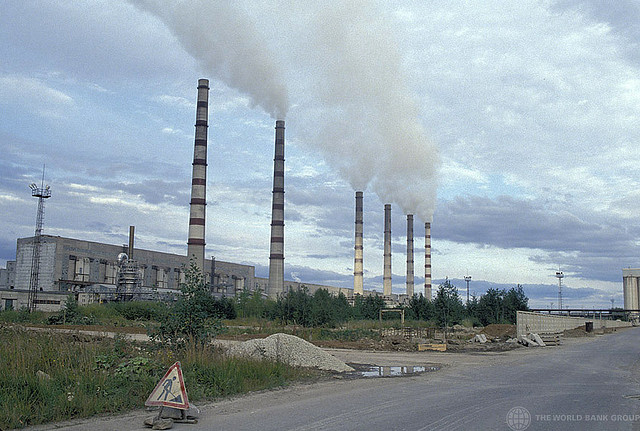“Why have countries not adopted ‘ambitious’ targets on climate change?”
May 17 The Durban Climate Change Conference created public pressure for greenhouse gas emission reduction, but yielded little action from governments, writes Naman Sanghvi, 23, a Correspondent from India, who explains some reasons behind the failure to increase targets.
The Durban Climate Change Conference created public pressure for greenhouse gas emission reduction, but yielded little action from governments, writes Naman Sanghvi, 23, a Correspondent from India, who explains some reasons behind the failure to increase targets.
The entire climate agreement is built around reducing emissions back within permissible limits – a maximum of two degrees above pre-industrial levels. But in spite of years of debate and regardless of the introduction of many mechanisms and action items like the Clean Development Mechanism, the world is still accelerating towards global mean temperature rises above the two degree ceiling.
The ‘2012 Emissions Gap Report’ by the United Nations Environment Program says that greenhouse gases are 14 per cent above where they should be, so as to limit temperature rise to two degrees[i]. In fact the World Bank’s report ‘Turn Down the Heat’ says that the world is set toward a temperature rise of four degrees by the end of the century[ii].
Since the UN Climate Change Conference in Durban, various think tanks, organizations and public representative groups have been putting immense pressure on governments –both developed and developing, to take greater action and greater legally binding emission reduction commitments – to be ‘more ambitious’.
There are a couple of reasons why countries have not increased their emission reduction commitments:
- The financial crisis and economic slowdown: Economies including the USA, EU and Asia have been under tremendous pressure in the last couple of months to revive economies, get back jobs and facilitate growth. Europe is still in one of the biggest economic crisis it has ever seen. Such a bleak global scenario compels economies to prioritize and put money into reviving business, jobs and the economy, rather than into combating climate change.
- The Blame Game: Mandatory emission targets will result in increased environment-associated taxes, penalties and compliances, all of which will have a negative impact on businesses in the long run. Many countries refuse to take ambitious targets, citing lack of similar initiative from other countries. Apart from this, countries like Canada, Russia and Japan have refused to ratify and commit to the second period of the Kyoto Protocol, thus refusing to take mandatory emission reduction targets. This discourages other countries to commit too. The direction negotiations have taken has been to get countries to ‘commit’ and at least agree to legally binding commitments first; leave alone taking on increased reduction targets.
- Still a perception of climate change as ‘a brake to economic growth’ rather than ‘a necessity’: Growing economies like China, India and Brazil, as well as developed countries like the USA, Australia and Japan look at climate change as an expense that will impact their economic growth. Their arguments about inaction directly and indirectly point toward a distrust of the other countries, and perception of action on climate change as curbing their growth. Whether this is true or not, this argument will not hold when there is no world for economies to grow. It is now proven that natural calamities are induced by changes in climate, which are caused by human action. Hurricane Sandy caused damages amounting to close to $50 billion[iii], which is much more than what has been promised by developed countries as financial assistance to mitigate and adapt to climate change. This is just one event, and it is hard to imagine the losses we are looking at, given all the calamities we will have to deal with if urgent action isn’t taken.
- Disagreement over concept of ‘Equity’ and ‘ Common but differentiated responsibilities’: Developing countries argue that they should not have any responsibility in reducing emissions, and that developed countries should take greater responsibility as historically they contributed to the problem of building up greenhouse gases more. On the other hand developed countries argue that developing countries are major emitters now and should also share the responsibility. This standoff has dragged on for years and has been one of the major reasons why we do not have a ‘Climate Deal’ yet.
Nation-level negotiations are never straightforward, and a variety of issues have led to extremely slow progress on climate change talks.
Yet things have still not spun out of control, and to ensure that they don’t, an increase in ambition is imperative. If countries do not act now, it will get tougher in the coming years, as countries will be forced into a situation where they will have to take even greater emission reduction commitments – ones that might technologically and financially prove much more challenging.
Countries must compromise and agree now. We can no longer afford any further delay!
Read more detailed analysis on these issues at World Resources institute (insights) , Down to Earth , UNFCCC
…………………………………………………………………………………………………………………
About me: I am an Engineering graduate passionate about renewable energy, and am currently working in Renewable energy sector (Business Development for a IPP)
In college I dabbled in various projects ranging from: growing plants with an irrigation system I designed, designing and racing an All-Terrain Vehicle, and developing a carbon footprint calculator.
My interests lie in the business side of renewable energy and the intersection of youth and social innovation. I am currently based out of Mumbai, and can be reached at sanghvi.naman1@gmail.com
…………………………………………………………………………………………………………………
Opinions expressed in this article are those of the author and do not necessarily represent the views of the Commonwealth Youth Programme. Articles are published in a spirit of dialogue, respect and understanding. If you disagree, why not submit a response?
To learn more about becoming a Commonwealth Correspondent please visit: http://www.yourcommonwealth.org/submit-articles/commonwealthcorrespondents/
…………………………………………………………………………………………………………………
photo credit: World Bank Photo Collection via photopin cc




